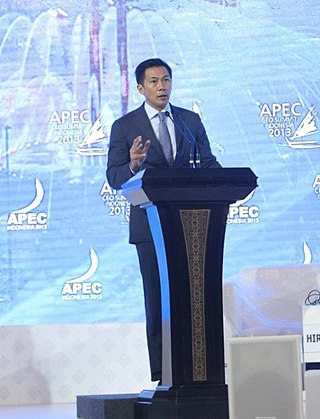Related Research Articles
Psychophysiology is the branch of psychology that is concerned with the physiological bases of psychological processes. While psychophysiology was a general broad field of research in the 1960s and 1970s, it has now become quite specialized, based on methods, topic of studies and scientific traditions. Methods vary as combinations of electrophysiological methods, neuroimaging, and neurochemistry. Topics have branched into subspecializations such as social, sport, cognitive, cardiovascular, clinical and other branches of psychophysiology.

Leadership, is defined as the ability of an individual, group, or organization to "lead", influence, or guide other individuals, teams, or organizations.
Group dynamics is a system of behaviors and psychological processes occurring within a social group, or between social groups. The study of group dynamics can be useful in understanding decision-making behaviour, tracking the spread of diseases in society, creating effective therapy techniques, and following the emergence and popularity of new ideas and technologies. These applications of the field are studied in psychology, sociology, anthropology, political science, epidemiology, education, social work, leadership studies, business and managerial studies, as well as communication studies.

Leon Festinger was an American social psychologist who originated the theory of cognitive dissonance and social comparison theory. The rejection of the previously dominant behaviorist view of social psychology by demonstrating the inadequacy of stimulus-response conditioning accounts of human behavior is largely attributed to his theories and research. Festinger is also credited with advancing the use of laboratory experimentation in social psychology, although he simultaneously stressed the importance of studying real-life situations, a principle he practiced when personally infiltrating a doomsday cult. He is also known in social network theory for the proximity effect.
Organization development (OD) is the study and implementation of practices, systems, and techniques that affect organizational change. The goal of which is to modify a group's/organization's performance and/or culture. The organizational changes are typically initiated by the group's stakeholders. OD emerged from human relations studies in the 1930s, during which psychologists realized that organizational structures and processes influence worker behavior and motivation.
In psychology, the Zeigarnik effect, named after Lithuanian-Soviet psychologist Bluma Zeigarnik, occurs when an activity that has been interrupted may be more readily recalled. It postulates that people remember unfinished or interrupted tasks better than completed tasks. In Gestalt psychology, the Zeigarnik effect has been used to demonstrate the general presence of Gestalt phenomena: not just appearing as perceptual effects, but also present in cognition.
Goal setting involves the development of an action plan designed in order to motivate and guide a person or group toward a goal. Goals are more deliberate than desires and momentary intentions. Therefore, setting goals means that a person has committed thought, emotion, and behavior towards attaining the goal. In doing so, the goal setter has established a desired future state which differs from their current state thus creating a mismatch which in turn spurs future actions. Goal setting can be guided by goal-setting criteria such as SMART criteria. Goal setting is a major component of personal-development and management literature. Studies by Edwin A. Locke and his colleagues, most notably, Gary Latham have shown that more specific and ambitious goals lead to more performance improvement than easy or general goals. Difficult goals should be set ideally at the 90th percentile of performance, assuming that motivation and not ability is limiting attainment of that level of performance. As long as the person accepts the goal, has the ability to attain it, and does not have conflicting goals, there is a positive linear relationship between goal difficulty and task performance.
Organizational behavior or organisational behaviour is the "study of human behavior in organizational settings, the interface between human behavior and the organization, and the organization itself". Organizational behavioral research can be categorized in at least three ways:

Kurt Lewin was a German-American psychologist, known as one of the modern pioneers of social, organizational, and applied psychology in the United States. During his professional career, Lewin's academic research and writings focuses on applied research, action research, and group communication.

Suspense is a state of anxiety or excitement caused by mysteriousness, uncertainty, doubt, or undecidedness. In a narrative work, suspense is the audience's excited anticipation about the plot or conflict, particularly as it affects a character for whom the audience feels sympathy. However, suspense is not exclusive to narratives.

Bluma Zeigarnik was a Soviet psychologist of Lithuanian origin, a member of the Berlin School of experimental psychology and the so-called Vygotsky Circle. She contributed to the establishment of experimental psychopathology as a separate discipline in the Soviet Union in the post-World War II period.
Maintenance actions, historically referred to as socio-emotive actions, are those leadership actions taken by one or more members of a group to enhance the social relationships among group members. They tend to increase the overall effectiveness of the group and create a more positive atmosphere of interaction within the group.
Julian B. Rotter was an American psychologist known for developing social learning theory and research into locus of control. He was a faculty member at Ohio State University and then the University of Connecticut. A Review of General Psychology survey, published in 2002, ranked Rotter as the 64th most eminent and 18th most widely cited psychologist of the 20th century. A 2014 study published in 2014 placed him at #54 among psychologists whose careers spanned the post-World War II era.
Job performance assesses whether a person performs a job well. Job performance, studied academically as part of industrial and organizational psychology, also forms a part of human resources management. Performance is an important criterion for organizational outcomes and success. John P. Campbell describes job performance as an individual-level variable, or something a single person does. This differentiates it from more encompassing constructs such as organizational performance or national performance, which are higher-level variables.

In psychology, relaxation is the emotional state of low tension, in which there is an absence of arousal, particularly from negative sources such as anger, anxiety, or fear.
Positive psychology is defined as a method of building on what is good and what is already working instead of attempting to stimulate improvement by focusing on the weak links in an individual, a group, or in this case, a company. Implementing positive psychology in the workplace means creating an environment that is more enjoyable, productive, and values individual employees. This also means creating a work schedule that does not lead to emotional and physical distress.
Interruption science is the interdisciplinary scientific study concerned with how interruptions affect human performance, and the development of interventions to ameliorate the disruption caused by interruptions. Interruption science is a branch of human factors psychology and emerged from human–computer interaction and cognitive psychology.
Harwood research refers to research in organizational psychology that took place at Harwood Manufacturing, a Virginia-based textiles manufacturer, over the course of four decades in the early to mid-Twentieth Century.
Maria Arsenjevna Rickers-Ovsiankina (1898–1993) was a Russian-German-American psychologist. She studied what is now known as the Ovsiankina effect, a variation of the Zeigarnik effect. Ovsiankina worked in a variety of psychology jobs, including working with schizophrenia patients. She wrote books about psychological testing.
Shahar Lev-Ari is an Israeli public health scholar. He is a member and former Chair of the Department of Health Promotion at the School of Public Health, Sackler Faculty of Medicine at Tel Aviv University. He is a visiting scholar at Michael P. Snyder's Lab in the Department of Genetics at Stanford University.
References
- ↑ Ovsiankina, Maria (1928). Die Wiederaufnahme unterbrochener Handlungen (PDF) (in German). Psychologische Forschung. pp. 302–379. Archived from the original (PDF) on 5 February 2022.
{{cite book}}: CS1 maint: location missing publisher (link) - ↑ Lewin, Kurt (1936). Principles of topological psychology.
- ↑ Montag, Christian; Lachmann, Bernd; Herrlich, Marc; Zweig, Katharina (2019-07-23). "Addictive Features of Social Media/Messenger Platforms and Freemium Games against the Background of Psychological and Economic Theories". International Journal of Environmental Research and Public Health. 16 (14): 2612. doi: 10.3390/ijerph16142612 . ISSN 1660-4601. PMC 6679162 . PMID 31340426.
- ↑ Online, EDHEC (2021-04-01). "How to Learn Better with the Zeigarnik Effect?". EDHEC Online. Retrieved 2023-08-14.
- ↑ Bauer, Christoph; Spangenberg, Katie; Spangenberg, Eric R.; Herrmann, Andreas (2022-07-01). "Collect them all! Increasing product category cross-selling using the incompleteness effect". Journal of the Academy of Marketing Science. 50 (4): 713–741. doi: 10.1007/s11747-021-00835-6 . ISSN 1552-7824.
- ↑ TV, Buddy (2009-09-14). "'True Blood' Finale Sets Up More Cliffhangers". BuddyTV. Retrieved 2023-08-14.
- ↑ Rose, Dr Hannah (2022-06-14). "The psychology of unfinished tasks". Ness Labs. Retrieved 2023-08-14.
- ↑ Weigelt, Oliver; Syrek, Christine (2017-12-20). "Ovsiankina's Great Relief: How Supplemental Work during the Weekend May Contribute to Recovery in the Face of Unfinished Tasks". International Journal of Environmental Research and Public Health. 14 (12): 1606. doi: 10.3390/ijerph14121606 . ISSN 1660-4601. PMC 5751022 . PMID 29261139.